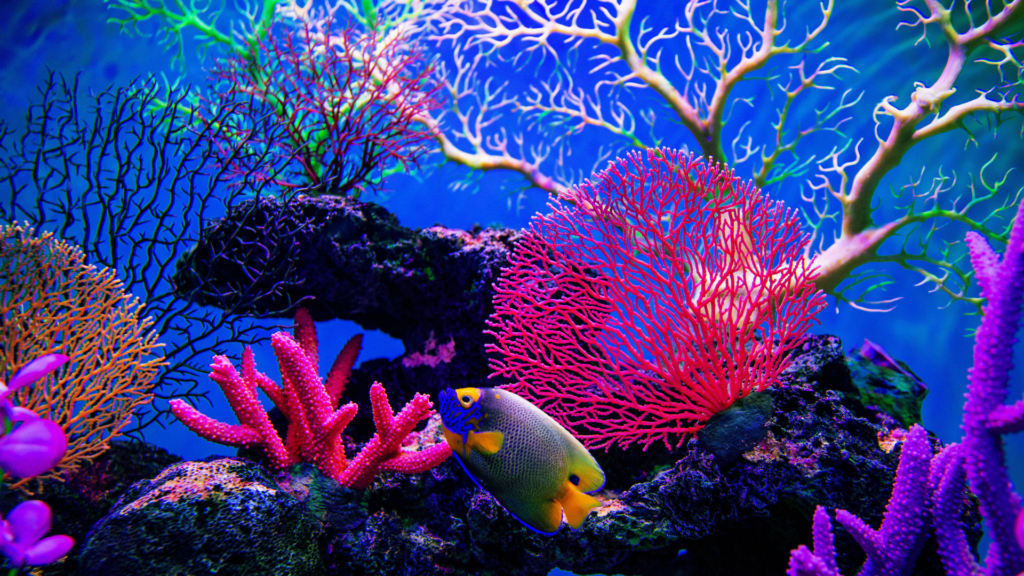Welcome to the colorful and vibrant world of coral reefs, where life thrives in abundance! Coral reefs are home to diverse marine species that coexist in perfect harmony. These underwater ecosystems provide shelter and food for many sea creatures and play a crucial role in maintaining the delicate balance of our planet’s ecology.
In this blog post, we explore the fascinating world of coral reefs and unveil their importance as guardians of marine biodiversity. So, let’s dive deep into this magical realm and discover its hidden wonders!
Introduction to Coral Reefs
Coral reefs are one of the most biodiverse ecosystems on Earth. They are home to 25% of all marine species, including fish, invertebrates, algae, and microorganisms. Coral reefs are also some of the most threatened ecosystems on the planet. Climate change, unsustainable fishing practices, pollution, and coastal development threaten them.
Coral reefs are formed when coral polyps attach to hard surfaces on the seafloor. Coral polyps are small animals that secrete a hard calcium carbonate skeleton. Over time, these skeletons build up and create coral reefs. The reef is composed of many different types of coral and other organisms, such as algae, fish, and invertebrates.
Coral reefs provide important ecosystem services such as shoreline protection, fisheries support, and tourism revenue. They also play a critical role in the global carbon cycle by sequestering atmospheric carbon dioxide. Despite their importance, coral reefs are in decline worldwide due to human activities.
The Importance of Coral Reefs in Marine Biodiversity
Coral reefs provide critical habitat for a wide range of marine species. They are home to 25% of all marine life, including over 4,000 species of fish, 800 species of hard coral, and thousands of other invertebrates. Coral reefs are also one of the most diverse ecosystems on Earth.
Coral reefs play a key role in the health of the ocean. They help to maintain water quality and clarity, prevent shoreline erosion, and provide nursery grounds for commercially important fish species. Coral reefs also support tourism, which is vital to many coastal economies.
The loss of coral reefs would have devastating impacts on marine biodiversity. As keystone habitats, they provide essential ecosystem services that would be impossible to replace. The loss of coral reefs would also lead to the loss of livelihoods for millions of people who depend on them for food and income.
Human activities, including overfishing, pollution, and climate change, threaten coral reefs. To protect them, we must reduce these pressures and manage them sustainably. This includes protecting areas with high levels of biodiversity, establishing new marine protected areas, and implementing effective fisheries management practices.
Factors Affecting the Health of Coral Reefs
Coral reefs are some of the most diverse ecosystems on Earth, providing homes for various marine species. However, these delicate ecosystems are under threat from a number of human activities.
One of the biggest threats to coral reefs is pollution. Nutrients from agricultural runoff and sewage can stimulate the growth of algae, which competes with coral for space and sunlight. Algae can also smother coral and block out light, causing the coral to bleach and die. In addition, pollutants such as oil and chemicals can directly damage coral tissue.
Another major threat to coral reefs is climate change. Rising sea temperatures can cause corals to bleach while increasing ocean acidity makes building skeletons harder. Climate change also increases the frequency and intensity of storms, which can damage or destroy coral reefs.
Fortunately, some things can be done to help protect coral reefs. Reducing pollution and mitigating climate change will help reduce the threats to these important ecosystems. In order to protect coral reefs, we need to reduce our impact on them.
This means fishing sustainably, reducing pollution, and taking action to combat climate change. We must also support conservation efforts to protect coral reefs and their inhabitants.
Conservation Efforts to Protect and Restore Coral Reefs
Coral reefs are one of the most diverse ecosystems in the world. They are home to marine life, including fish, turtles, and other wildlife. Unfortunately, these unique ecosystems are under threat from a variety of human activities.
The good news is that many conservation efforts are underway to protect and restore coral reefs. These efforts include:
- Establishing marine protected areas (MPAs)
- Restricting or banning certain fishing practices
- Implementing better land-use policies
- Reducing pollution and runoff from coastal development
- Supporting research and monitoring programs
Understanding the Link Between Coral Reefs and Biodiversity
Coral reefs are integral to the health of our marine ecosystems, acting as a refuge for countless species. Through their intricate ecological networks, coral reefs provide food and shelter for fish, invertebrates, and other organisms while also playing an important role in mitigating climate change.
While human activities have adversely affected many coral reef systems worldwide, conservation efforts remain essential to protect these vital ecosystems for future generations. With increased effort from governments, communities, and individuals alike, we can safeguard these fragile guardians of marine biodiversity in the years ahead.

